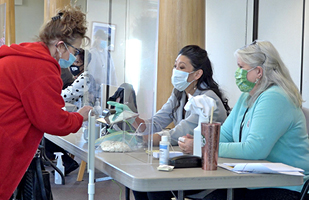Chief Justice Applauds 1,026 Ohio Attorneys Who Served as Poll Workers

During the pandemic, 1,026 Ohio attorneys served as poll workers on election day.

During the pandemic, 1,026 Ohio attorneys served as poll workers on election day.
Ohio Supreme Court Chief Justice Maureen O’Connor’s call for attorneys to volunteer during the pandemic-impacted elections resulted in 1,026 lawyers seeing duty as poll workers on Nov. 3, according to figures released today by the Ohio secretary of state.
“I couldn’t be more proud of the lawyers who stepped up to work the polls for the Nov. 3 election. Some were repeat poll workers, but the vast majority were first time poll workers,” Chief Justice O’Connor said. “As the global pandemic has upended our lives, an efficient election process was critical. I’m glad that lawyers performed this crucial civic duty during these trying times.”
The chief justice’s program was coordinated with Secretary of State Frank LaRose. In return for working at the polls, Ohio lawyers received four hours of credits under the Continuing Legal Education (CLE) program that is required of all lawyers.
“We couldn’t wait for them to come to us -- we needed to go to them, and wow, did they step up,” LaRose said. “Serving as a poll worker isn’t easy. It’s long hours and hard work – but it’s also incredibly rewarding. Make no mistake, this election would not have been as successful as it was without these dedicated, patriotic Ohioans.”
Most poll workers are generally older Americans. According to the Election Assistance Commission, 58 percent of poll workers were 61 or older during the 2018 elections. They are at higher risk of contracting COVID-19 than younger people, hence the call for new faces at the polling places.
Businesses, veteran groups, charities, high schools and colleges, and even barber shops, recruited a total of 56,789 Ohioans trained and ready to serve as poll workers, the secretary of state’s office said.


